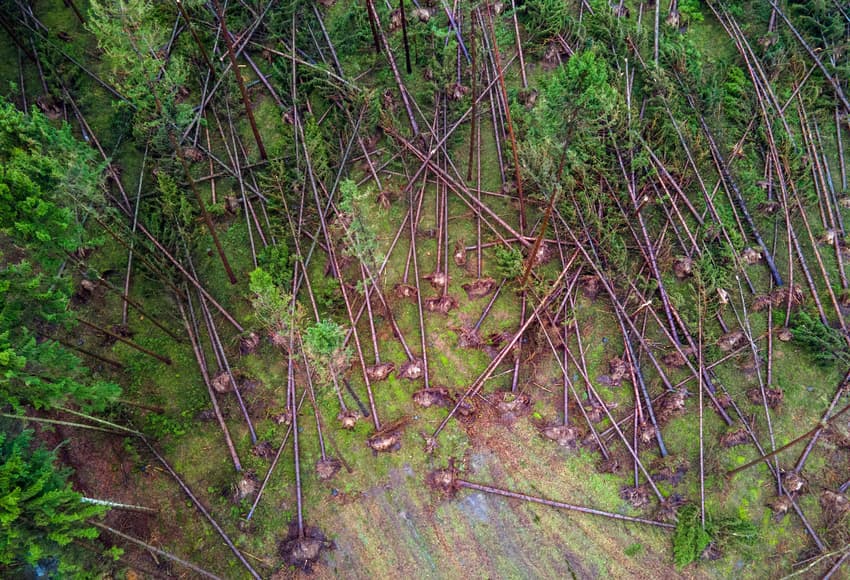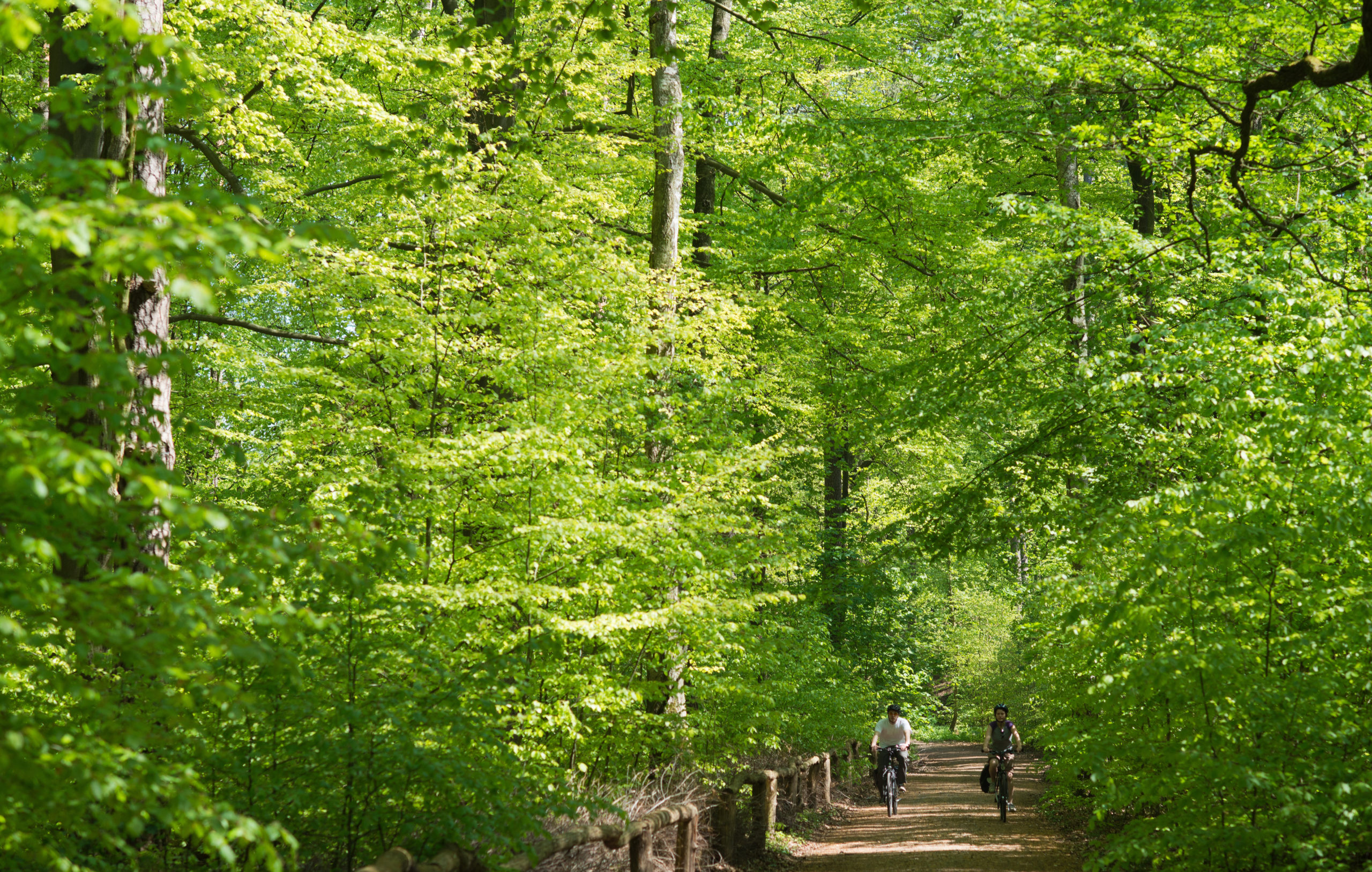How climate change is threatening Germany's forests

In the past three years, Germany has lost thousands of hectares of forest due to the ever warmer and drier climate. There are calls for new funding to help forest owners adapt to new conditions. What's going on?
Over the past few years, the effects of climate change in Germany have become ever more noticeable. Along with more intense cold and heat spells, the country saw disastrous flash floods in 2021 that claimed more than a hundred lives and caused billions of euros of damage to homes and infrastructure.
However, for the northern regions of the country in particular, it's been the lack of rainfall and intense heat that has caused the most concern among agricultural workers and forest owners.
They argue that Germany's iconic woodland could become a victim of the climate crisis if more isn't done to help the forests adapt. If that happens, they say, one of the major absorbers of CO2 in the atmosphere would no longer be available in the fight against global warming.
Max von Elverfeldt, chairman of the family business Land und Forst, told DPA that a lack of investment in conserving forests would primarily affect future generations.
"Our forests are our most successful climate activists, without them we will not achieve our climate goals," he explained.
How bad is the damage so far?
According to Andreas Bitter, president of the Federation of German Forest Owners' Associations (AGDW), more than 400,000 hectares of forest area have already been destroyed by the effects of heat and drought since 2018.
Back in February, an intense storm destroyed swathes of a forest in Mecklenburg Western-Pomerania, ripping 60-year-old trees out by their roots and affecting around half a million cubic metres of land.
Speaking ahead of a meeting of the state agriculture ministers on Monday, Bitter warned: "Time is pressing. The government must act."
He said funding for forest adaptation to climate change should be implemented quickly, otherwise it would be too late.
The president of the German Forestry Council, Georg Schirmbeck, put the material damage caused by drought and bark beetle infestation at €12.5 billion, spread over three years of crisis.
"Assets were literally destroyed," he told the Neue Osnabrücker Zeitung.
READ ALSO: EXPLAINED: How the climate crisis is hitting Europe hard
What exactly are forest owners calling for?
Campaigners primarily want additional funding to be freed up and used for projects that will make forests better equipped to deal with the changing climate.
According to Schirmbeck, the transformation of the forests could cost around €50bn in total, with at least €1 billion in support needed each year from the state.
The president of the German Forestry Council is also advocating for stricter guidelines on the sustainable use of wood.
"The renewable raw material wood, both as a building material and as a final energy source, is an important element in achieving the German government's climate goals with the move away from fossil fuels," said Schirmbeck.

Two cyclists enjoy sunny weather in Tegel Forest in Berlin. Photo: picture alliance / dpa | Peer GrimmAhead of the meeting, the environmental association BUND laid out a number of proposals for preserving forests in the long term.
"Our forests have been weakened by several years of drought, over-intensive forestry and the large-scale cultivation of conifers," BUND chairman Olaf Bandt told RND on Monday. "We demand an ecological forest turnaround."
For example, at least one tenth of the forest area must be designated as natural forest and kept out of the hands of foresters.
In addition, there must be "an immediate stop to logging in publicly owned deciduous forests that are more than 100 years old," Bandt said.
The rapid conversion of coniferous forests to deciduous forests and a different approach to wild animals such as deer, which use new plantations as food and thus damage them, are also necessary, he argued.
READ ALSO: Germany chooses Greenpeace chief as first climate envoy
Are there any other perspectives?
Yes. Naturally, the timber industry isn't particularly enamoured with proposals to limit their access to the forest, and have argued that the number of new trees planted each year can easily replace what they remove.
"It is best for climate protection if the CO2 is stored in wood products or if the wood replaces climate-polluting materials instead of letting it rot unused in the forest," Denny Ohnesorge, managing director of the German Timber Industry Association (HDH), told RND.
Meanwhile, hunters have argued that the monocultures created by humans over decades is a huge cause of harm in the forests, and that more planting and reforestation is needed.
Comments (1)
See Also
What's going on?
Over the past few years, the effects of climate change in Germany have become ever more noticeable. Along with more intense cold and heat spells, the country saw disastrous flash floods in 2021 that claimed more than a hundred lives and caused billions of euros of damage to homes and infrastructure.
However, for the northern regions of the country in particular, it's been the lack of rainfall and intense heat that has caused the most concern among agricultural workers and forest owners.
They argue that Germany's iconic woodland could become a victim of the climate crisis if more isn't done to help the forests adapt. If that happens, they say, one of the major absorbers of CO2 in the atmosphere would no longer be available in the fight against global warming.
Max von Elverfeldt, chairman of the family business Land und Forst, told DPA that a lack of investment in conserving forests would primarily affect future generations.
"Our forests are our most successful climate activists, without them we will not achieve our climate goals," he explained.
How bad is the damage so far?
According to Andreas Bitter, president of the Federation of German Forest Owners' Associations (AGDW), more than 400,000 hectares of forest area have already been destroyed by the effects of heat and drought since 2018.
Back in February, an intense storm destroyed swathes of a forest in Mecklenburg Western-Pomerania, ripping 60-year-old trees out by their roots and affecting around half a million cubic metres of land.
Speaking ahead of a meeting of the state agriculture ministers on Monday, Bitter warned: "Time is pressing. The government must act."
He said funding for forest adaptation to climate change should be implemented quickly, otherwise it would be too late.
The president of the German Forestry Council, Georg Schirmbeck, put the material damage caused by drought and bark beetle infestation at €12.5 billion, spread over three years of crisis.
"Assets were literally destroyed," he told the Neue Osnabrücker Zeitung.
READ ALSO: EXPLAINED: How the climate crisis is hitting Europe hard
What exactly are forest owners calling for?
Campaigners primarily want additional funding to be freed up and used for projects that will make forests better equipped to deal with the changing climate.
According to Schirmbeck, the transformation of the forests could cost around €50bn in total, with at least €1 billion in support needed each year from the state.
The president of the German Forestry Council is also advocating for stricter guidelines on the sustainable use of wood.
"The renewable raw material wood, both as a building material and as a final energy source, is an important element in achieving the German government's climate goals with the move away from fossil fuels," said Schirmbeck.

Ahead of the meeting, the environmental association BUND laid out a number of proposals for preserving forests in the long term.
"Our forests have been weakened by several years of drought, over-intensive forestry and the large-scale cultivation of conifers," BUND chairman Olaf Bandt told RND on Monday. "We demand an ecological forest turnaround."
For example, at least one tenth of the forest area must be designated as natural forest and kept out of the hands of foresters.
In addition, there must be "an immediate stop to logging in publicly owned deciduous forests that are more than 100 years old," Bandt said.
The rapid conversion of coniferous forests to deciduous forests and a different approach to wild animals such as deer, which use new plantations as food and thus damage them, are also necessary, he argued.
READ ALSO: Germany chooses Greenpeace chief as first climate envoy
Are there any other perspectives?
Yes. Naturally, the timber industry isn't particularly enamoured with proposals to limit their access to the forest, and have argued that the number of new trees planted each year can easily replace what they remove.
"It is best for climate protection if the CO2 is stored in wood products or if the wood replaces climate-polluting materials instead of letting it rot unused in the forest," Denny Ohnesorge, managing director of the German Timber Industry Association (HDH), told RND.
Meanwhile, hunters have argued that the monocultures created by humans over decades is a huge cause of harm in the forests, and that more planting and reforestation is needed.
Join the conversation in our comments section below. Share your own views and experience and if you have a question or suggestion for our journalists then email us at [email protected].
Please keep comments civil, constructive and on topic – and make sure to read our terms of use before getting involved.
Please log in here to leave a comment.